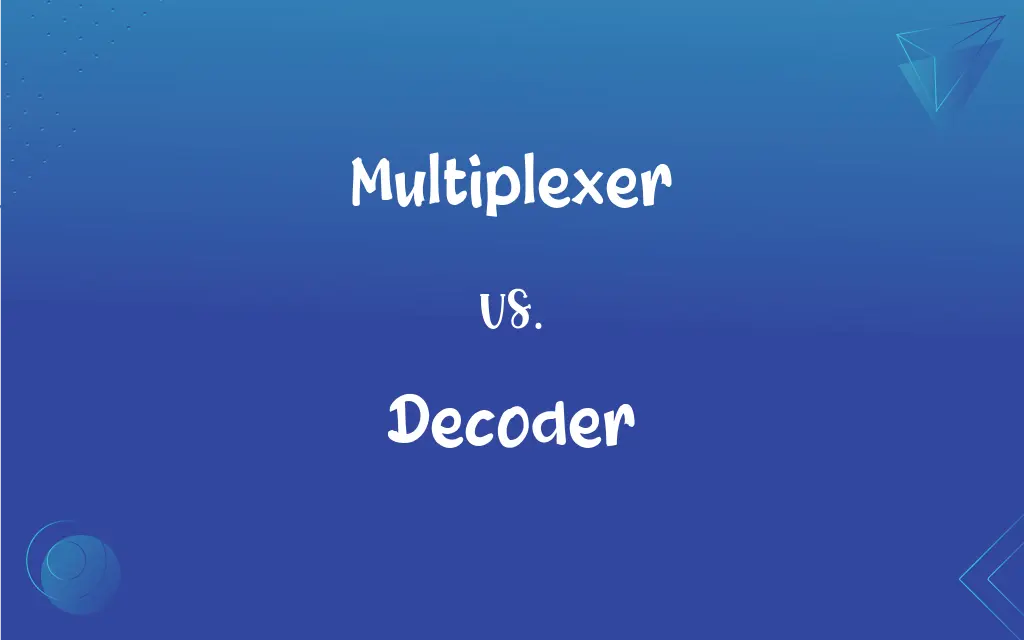Multiplexer vs. Decoder: What's the Difference?
Edited by Aimie Carlson || By Janet White || Published on February 23, 2024
A Multiplexer combines multiple input signals into a single output line, while a Decoder converts coded data into a recognizable format.

Key Differences
A Multiplexer (MUX) selects one of several input signals and forwards it to a single output. Decoder, in contrast, translates encoded data or signals into a format that is easily understood.
Multiplexers are used in scenarios where multiple data signals need to be transmitted over a single line, thus saving on wiring and complexity. Decoders are used in systems where data needs to be decoded or translated, like digital displays or data retrieval systems.
In a Multiplexer, inputs are selected using control lines, which determine which input is connected to the output. In a Decoder, input bits are translated into a specific number of outputs, often to retrieve original data.
Multiplexers are essential in communication systems to manage bandwidth efficiently by combining several signals. Decoders play a vital role in digital electronics, translating binary data into a human or machine-readable format.
The functionality of a Multiplexer is about selecting and forwarding, whereas a Decoder is about interpreting and presenting information in a usable format.
ADVERTISEMENT
Comparison Chart
Function
Combines multiple inputs into one output
Converts coded data to a recognizable format
Use Case
Used in data transmission to save bandwidth
Used to interpret and display data
Control Mechanism
Uses control signals to select inputs
Decodes input signals to specific outputs
Application
Vital in communication systems for signal management
Crucial in digital displays and data retrieval systems
Operation
Selective forwarding of data
Interpretation and presentation of data
ADVERTISEMENT
Multiplexer and Decoder Definitions
Multiplexer
A Multiplexer efficiently manages bandwidth.
We use a MUX to handle multiple data streams.
Decoder
A Decoder translates encoded signals.
The decoder interprets the digital signal into audio.
Multiplexer
A Multiplexer selects one of many input signals.
The MUX directs the chosen signal to the processor.
Decoder
A Decoder converts binary data into a readable format.
This decoder converts binary to alphanumeric characters.
Multiplexer
A Multiplexer uses control lines for input selection.
Control lines in the MUX determine the active input.
Decoder
A Decoder is used in digital displays.
Decoders are used in LED displays for character representation.
Multiplexer
A Multiplexer transmits data over a single line.
The MUX simplifies our network layout.
Decoder
A Decoder retrieves original data from coded signals.
Our system's decoder retrieves the stored information accurately.
Multiplexer
A Multiplexer is essential in communication systems.
MUXes are crucial in our telecommunications network.
Decoder
A Decoder translates machine language.
The decoder translates these instructions for the CPU.
Multiplexer
A device that interleaves several activities; a switching device.
Decoder
One that decodes.
Multiplexer
A device that combines several input signals into a single output signal.
Decoder
A device that decodes a scrambled electronic signal to make it interpretable.
Multiplexer
A device that can interleave two or more activities
Decoder
A person who decodes secret messages
Decoder
A device that decodes a scrambled electronic signal e.g. of a satellite television signal
Decoder
The kind of intellectual who converts messages from a code to plain text
Decoder
A machine that converts a coded text into ordinary language
FAQs
What is a common use of a Decoder?
In digital displays and data retrieval systems.
Where are Multiplexers commonly used?
In communication systems for efficient signal management.
What is a Multiplexer?
A device that combines multiple input signals into one output line.
What does a Decoder do?
A Decoder converts encoded or binary data into a readable format.
What controls the input selection in a Multiplexer?
Control lines determine which input signal is forwarded.
Is a Decoder necessary in computing?
Yes, for interpreting binary data into machine-readable formats.
Can a Decoder be used in audio systems?
Yes, decoders are used to convert digital signals into audio.
Can Multiplexers handle digital and analog signals?
Yes, there are both digital and analog Multiplexers.
Do Decoders only work with digital signals?
Primarily, but they can also interpret analog signals in some applications.
How does a Multiplexer save bandwidth?
By combining several signals into one, reducing the need for multiple lines.
What's the difference in complexity between a Multiplexer and a Decoder?
Multiplexers are generally simpler, focusing on signal selection; Decoders are more complex, needing to interpret data.
Can both Multiplexers and Decoders be integrated into a single device?
Yes, in some systems, they are combined for efficient data handling.
Are Multiplexers programmable?
Some advanced Multiplexers can be programmed for specific tasks.
Does a Decoder need to be compatible with the encoded format?
Yes, it must be designed to interpret the specific encoding used.
How does a Decoder aid in communication?
By translating encoded signals into understandable formats.
What is an analog Multiplexer?
A Multiplexer that handles analog signals.
Can a Decoder translate encrypted data?
Only if it's designed to decode that specific encryption format.
What's the role of a Decoder in a TV set?
To decode broadcast signals into viewable TV content.
Can a Multiplexer improve network efficiency?
Yes, by reducing the number of physical connections.
Is a Multiplexer used in data centers?
Yes, for managing multiple data streams efficiently.
About Author
Written by
Janet WhiteJanet White has been an esteemed writer and blogger for Difference Wiki. Holding a Master's degree in Science and Medical Journalism from the prestigious Boston University, she has consistently demonstrated her expertise and passion for her field. When she's not immersed in her work, Janet relishes her time exercising, delving into a good book, and cherishing moments with friends and family.
Edited by
Aimie CarlsonAimie Carlson, holding a master's degree in English literature, is a fervent English language enthusiast. She lends her writing talents to Difference Wiki, a prominent website that specializes in comparisons, offering readers insightful analyses that both captivate and inform.
































































